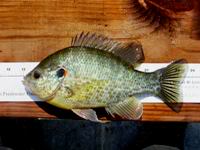|
Forums36
Topics40,994
Posts558,310
Members18,518
| |
Most Online3,612
Jan 10th, 2023
|
|
|
12 members (Theo Gallus, cgmbny, Brian from Texas, Zep, esshup, Cliff76169, rjackson, Don Kennedy, tlogan, Dave Davidson1, Bigtrh24, canyoncreek),
914
guests, and
249
robots. |
|
Key:
Admin,
Global Mod,
Mod
|
|
|
|
Joined: Mar 2005
Posts: 21,508 Likes: 269
Moderator Hall of Fame 2014  Lunker
|

Moderator Hall of Fame 2014  Lunker
Joined: Mar 2005
Posts: 21,508 Likes: 269 |
Never known of using Urea in ponds as N is rarely the missing element. We use it on food plots for deer and turkey. What is usually missing in ponds (water) is the P of NPK fertilizer(no pun intended). In aquatic organisms the most common form of nitrogen waste is ammonia, while land-dwelling organisms convert the toxic ammonia to either urea or uric acid. Urea is found in the urine of mammals and amphibians, as well as some fish. Ammonia (NH3) is another common byproduct of the metabolism of nitrogenous compounds. Ammonia is smaller, more volatile and more mobile than urea. If allowed to accumulate, ammonia would raise the pH in cells to toxic levels. Therefore many organisms convert ammonia to urea, even though this synthesis has a net energy cost. Being highly soluble in water urea if converted to ammonia can cause problems in ponds. Ammonia in Fish Ponds https://srac.tamu.edu/index.cfm/event/getFactSheet/whichfactsheet/111/.I have to wonder if the fish are thinking – man don’t pee in my water and tell me it’s raining.
.gif) 
|
|
|
|
Entire Thread
|

 Free fertilzer: organic, unlimited
Free fertilzer: organic, unlimited
|
pandscorp
|
10/20/10 10:37 PM
|

 Re: Free fertilzer: organic, unlimited
Re: Free fertilzer: organic, unlimited
|
pandscorp
|
10/21/10 01:04 PM
|

 Re: Free fertilzer: organic, unlimited
Re: Free fertilzer: organic, unlimited
|
Bluegillerkiller
|
10/21/10 02:41 PM
|

 Re: Free fertilzer: organic, unlimited
Re: Free fertilzer: organic, unlimited
|
pandscorp
|
10/21/10 03:08 PM
|

 Re: Free fertilzer: organic, unlimited
Re: Free fertilzer: organic, unlimited
|
Bluegillerkiller
|
10/21/10 03:29 PM
|

 Re: Free fertilzer: organic, unlimited
Re: Free fertilzer: organic, unlimited
|
jeffhasapond
|
10/21/10 04:28 PM
|

 Re: Free fertilzer: organic, unlimited
Re: Free fertilzer: organic, unlimited
|
pandscorp
|
10/21/10 05:09 PM
|

 Re: Free fertilzer: organic, unlimited
Re: Free fertilzer: organic, unlimited
|
Theo Gallus
|
10/26/10 01:56 AM
|

 Re: Free fertilzer: organic, unlimited
Re: Free fertilzer: organic, unlimited
|
ewest
|
10/26/10 06:25 PM
|

 Re: Free fertilzer: organic, unlimited
Re: Free fertilzer: organic, unlimited
|
Gflo
|
10/26/10 06:58 PM
|

 Re: Free fertilzer: organic, unlimited
Re: Free fertilzer: organic, unlimited
|
andedammen
|
10/27/10 12:33 PM
|

 Re: Free fertilzer: organic, unlimited
Re: Free fertilzer: organic, unlimited
|
ewest
|
10/27/10 01:54 PM
|

 Re: Free fertilzer: organic, unlimited
Re: Free fertilzer: organic, unlimited
|
andedammen
|
10/27/10 10:41 PM
|

 Re: Free fertilzer: organic, unlimited
Re: Free fertilzer: organic, unlimited
|
cellog
|
11/08/10 01:36 AM
|

 Re: Free fertilzer: organic, unlimited
Re: Free fertilzer: organic, unlimited
|
pandscorp
|
11/11/10 11:39 AM
|

 Re: Free fertilzer: organic, unlimited
Re: Free fertilzer: organic, unlimited
|
Revill
|
02/16/11 03:39 PM
|

 Re: Free fertilzer: organic, unlimited
Re: Free fertilzer: organic, unlimited
|
Dave Davidson1
|
02/16/11 03:47 PM
|

 Re: Free fertilzer: organic, unlimited
Re: Free fertilzer: organic, unlimited
|
JKB
|
02/16/11 04:01 PM
|

 Re: Free fertilzer: organic, unlimited
Re: Free fertilzer: organic, unlimited
|
Dave Davidson1
|
02/17/11 03:22 AM
|

 Re: Free fertilzer: organic, unlimited
Re: Free fertilzer: organic, unlimited
|
Todd3138
|
10/21/10 07:47 PM
|

 Re: Free fertilzer: organic, unlimited
Re: Free fertilzer: organic, unlimited
|
Dave Davidson1
|
10/22/10 02:36 AM
|

 Re: Free fertilzer: organic, unlimited
Re: Free fertilzer: organic, unlimited
|
Greg2010
|
10/22/10 09:34 AM
|

 Re: Free fertilzer: organic, unlimited
Re: Free fertilzer: organic, unlimited
|
keith_rowan
|
10/22/10 12:55 PM
|
|
Moderated by Bill Cody, Bruce Condello, catmandoo, Chris Steelman, Dave Davidson1, esshup, ewest, FireIsHot, Omaha, Sunil, teehjaeh57
|
|
|
|
|
|
|
|
|
|
My First
by Bill Cody - 05/06/24 07:22 PM
|
|
|
|
|
|
|
|
|
|
|
|
|
|
|
|